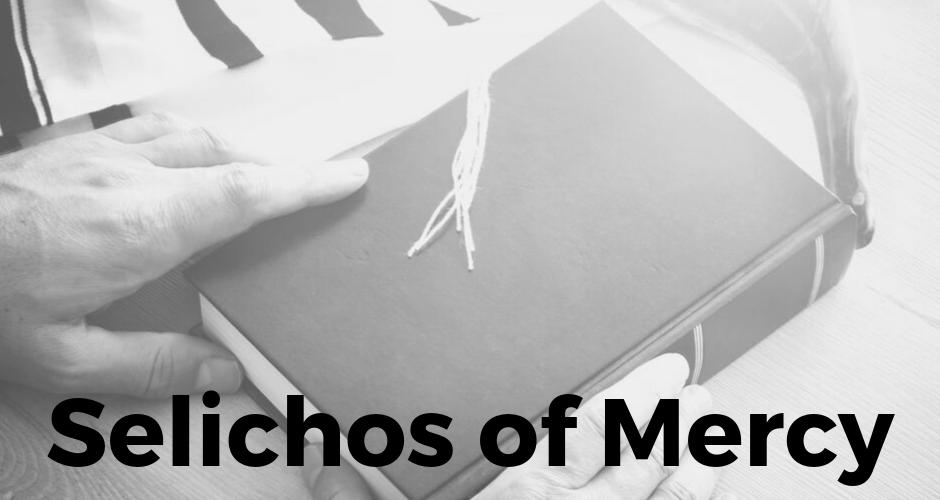SELICHOS OF MERCY | Harav Y. Reuven Rubin Shlita
SELICHOS OF MERCY
Harav Y. Reuven Rubin Shlita
It never ceases to amaze. Any group of Yidden, different voices, different talents, yet put them together by Kabolas Shabbos and they all blend in. The ba’al tefilah may be off-key, the group a bit of a mixed bag, yet start a familiar nigun and soon the whole place is jumping in tune. The genius of Bnei Yisroel is the ability to accept one another as members of a world beyond mere materialistic concerns. A moment of warmly felt yearning bursts forth and ignites into a shared experience of spiritual joy. We don’t always feel this connection, not in the dreary daily grind of the everyday, but come the moment and there it is. Embers of love for Hashem explode as feet tap and voices raise up into a hymn to our ability to be one. As we wade into the deep waters of the Hieliga Teig, we should look to this bond for support, hope and understanding.
The Slichos services we will all be attending are highlighted by the recitation of the “Thirteen Attributes of Mercy”. This moving passage from the Torah is highlighted in the Gemorah of Rosh Hashonah (17b)
“Rabbi Yochanan said: Were the verse not written, it would be impossible to say it. This teaches that The Eibishter wrapped Himself in a tallis like a prayer leader and demonstrated to Moshe Rabbenu the order of prayer. He said to him: ‘Anytime that Israel sins let them perform before Me this procedure and I shall forgive them.”
This holy passport of forgiveness comes with several Halachos. One is that normatively these prayers must be said with a minyan, and whilst standing. The sefer Meor Veshomash exclaims that the reason that these holy passages can only be said with a minyan is that the words aren’t meant to be said only with ones mouth, but it is incumbent that we actually act accordingly. When it says that Hashem is merciful, we must realise that for us to be forgiven we too must be merciful with one another. As the Gemorah teaches, “let them perform before Me this procedure”, in other words, they must not only articulate the lines from the siddur, they must fulfil them as well.
This then is the reason these passages are said with a minyan. Every minyan is made up of different types of Yidden, each with their own uniqueness, yet when we come together, we hopefully look beyond each others personalities and daven as one. This facilitates our being able to fulfil the mercifulness that Hashem speaks of, and in this way we are worthy of Hashem’s mercy. The same dynamic occurs with the other attributes the passage speaks of. Alone one cant act upon the Eibishter’s prescription for His divine mercy.
The Rebbe Rav Avrohom Moshe of Pshischa Zt”l used to say, “The world calls these days, ‘Selichos teig (Selichos Days)’, because we say Selichos on them. However said the Rebbe, “I say these are actually days of Slicha, (forgiveness) and Kaporah (atonement).” When we gather together to say Selichos, then each of us becomes one with each other, and we can practice the attributes we seek from the Eibishter, therewith being gifted with forgiveness.
The Toldos Adam writes:
“A person might be completely wicked, but if at the moment punishment is meant to befall him he is engaged in a mitzvah or thoughts of teshuva, the punishment cannot harm him.”
Explains the Mevaser Tov that our fortune depends not only on what is decreed upon us from Heaven, but also on our worthiness at the moment the decree is carried out. True, golus was long ago decreed upon us, but if we were to bind together in unity, this would create a protective shield to prevent the hardships of golus from striking us.
The Toldos Adam continues:
“When people surrender their personal interests for the sake of the community, joining together in love and brotherhood, their individual merits atone for one another’s misdeeds. No harsh judgement can ever befall them.”
So, yes, saying Selichos together is a powerful tool for forgiveness and shared growth. Our voices join one another, we speak of Hashem’s mercy whilst sharing a brotherhood of mercy for one another.
The Rebbe Reb’ Bunim of Pshischa Ztl points out that in the reading of the Tochacha in Parshas Ki Savo one sin is underlined. “Because you did not serve Hashem amid gladness and goodness of heart, when everything was abundant” (28:47). From this we learn how negative sadness and depression can be. Selichos comes with great potential of growth. It is a vehicle that can take us out of the depressive selfishness of the small-minded, and bring us to an understanding of what true teshuva is.
We are seeking forgiveness in a difficult world, if we daven together as one, sharing that which we plead for from Hashem, then this oneness will be our true shield of mercy. May these days of Slicha be just that, ‘teig’ for togetherness and the beginnings of true change.


